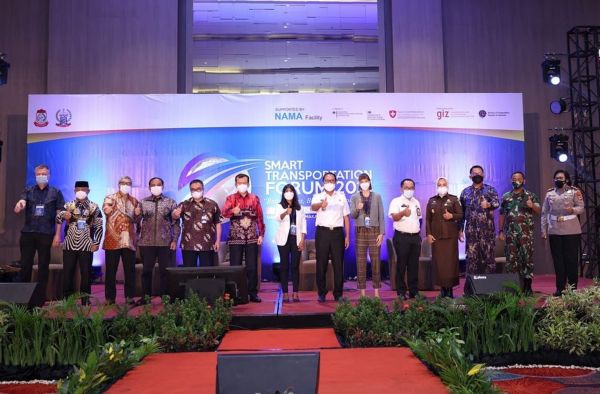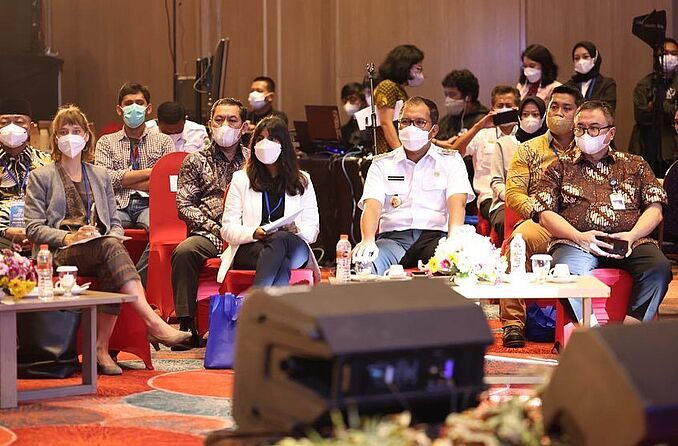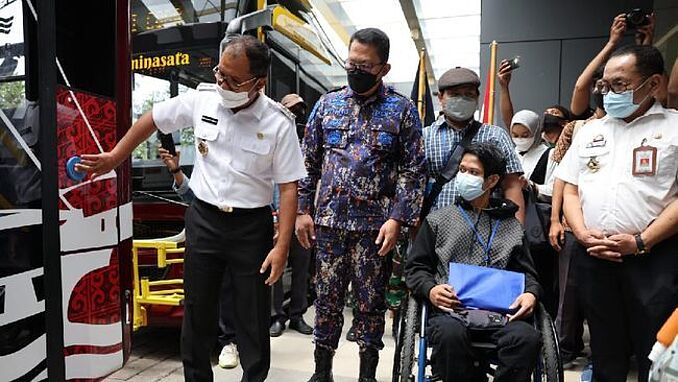Governments, private sector and civil society commit to sustainable and inclusive transport at Smart Transportation Forum in Indonesia’s Makassar

A good city is not only a city with modern design but also a city that has adequate public transport facilities and services. In the modern era, the public transport sector is growing, and with this emerges concepts like smart transport.
Smart transport is not just a label or a sophisticated-looking system but must also be sustainable and inclusive. Operations must be easily accessible to all, including for people with disabilities and the elderly. Sustainable transport is also about the reducing the use of private vehicles which in return reduces greenhouse gas emissions. As a result, the city not only looks modern but also is also environmentally sound.
The NAMA Support Project in Indonesia called “SUTRI NAMA” and its project component INDOBUS, funded by the Swiss State Secretariat of Economic Affairs (SECO), provides support to local governments in preparing smart transport through the development of Sustainable Urban Transport, which also includes feasibility studies for Bus Rapid Transit (BRT) development in five pilot cities, including Makassar Metropolitan.
From the concept above, the Makassar City Government took the initiative to organise the 2021 Smart Transportation Forum “Better Cities, Better Transportation” at Gammara Hotel Makassar on 1-2 December 2021. The forum, supported by SUTRI NAMA & INDOBUS, was planned in partnership with the Mayor of Makassar, Mr. Mohammad Ramdhan ‘Danny’ Pomanto since May 2021. According to Mayor Pomanto, this forum demonstrates his commitment with Deputy Mayor Fatmawati Rusdi to improve transport in Makassar for the better and to enhance coordination with other stakeholders including the central government, provincial government, and surrounding cities and regents.
The forum participants included a representative from the South Sulawesi Government, Mayor of Makassar, as well as representatives from the Regent of Gowa, Maros, and Takalar, Ministry of Transportation (MoT), BAPPENAS, Ministry of Public Works and Public Housing (MoPWH), Ministry of Foreign Affairs, non-government institutions, international donors, domestic and international financial institutions (PT. SMI, EIB, World Bank, AFD) and investors.
Over two days, round table meeting with a diverse group of stakeholders related to public transportation was held to foster dialogue and collaboration to develop smart transportation as well as sustainable urban transport in Makassar.
Warthane Puvanarajah, First Secretary for Climate and Environment, German Embassy in Indonesia representing Bundesministerium für Umwelt, Naturschutz, nukleare Sicherheit und Verbraucherschutz (BMUV), who was present at the event explained that cities like Makassar play an important role in efforts to reduce the negative impacts of climate change by implementing environmentally-friendly public transportation.
“Investing in low-carbon, inclusive and smart transportation can not only significantly reduce emissions from the transport sector but can also provide economic growth potential, to create new jobs and benefit everyone’s health,” said Puvanarajah.

© GIZ Indonesia
The BRT system is one of the solutions for smart transport. The lower investment cost of other sustainable transport systems and wider reach allow BRT to solve the problem of road congestion in busy cities in Indonesia, including Makassar in the short term.
On that note, Andrea Zbinden, Deputy Head, Economic Cooperation and Development (SECO), said that the BRT system in Makassar must be built and managed by stakeholders who understand the concept of sustainable urban transport so that this sustainable transportation system can further boost the city’s potential.
“To establish a reliable, equitable, and sustainable transport system, it is very important to link the BRT development plan in Metropolitan Makassar, which is supported by Switzerland through the State Secretariat for Economic Affairs (SECO) through the INDOBUS component, with the link to concrete financing options and to ensure that all relevant stakeholders have the necessary resources, skills, and knowledge,” said Zbinden.
One of the factors that enhances a sustainable transportation system is comfort and safety. Therefore, MoT has carried out a Buy the Service (BTS) program in the form of purchasing public transport services and/or a 100% subsidy by the government to a privately-owned public transport company. Thus, the operation and management of public transport will be more organised.
At the forum, MoT also launched the BTS program for people with disabilities.

© GIZ Indonesia
The implementation of the BTS subsidy scheme is called TEMAN BUS. Makassar and the Province of South Sulawesi were selected to receive funding for this facility from the MoT, which will provide an inclusive public transport system in Makassar Metropolitan.
The event concluded with a high-level meeting amongst the Acting Governor of South Sulawesi, Mayor of Makassar, Mayor of Gowa, Mayor of Maros, Mayor of Talakar, BAPPENAS, MoT, MoPWPH, SECO, BMU, GIZ, and others. for the upcoming BRT development with segregated lanes in Makassar. The future Makassar BRT system will be built with a total of 31.4 km of lanes, 37 stations and 13 routes capable of serving up to 80 thousand people per day, with an estimated construction cost of around Rp3,4 trillion ($238,4 million).
The discussion was a continuation from a Focus Group Discussion that was held the previous day on the result of the feasibility study on the Makassar BRT development conducted by SUTRI NAMA & INDOBUS jointly with FELICITY, a joint BMUV-EIB funded project implemented by GIZ. The representatives of the city, provincial and national governments provided their feedback and inputs to ensure the efficiency and smoothness of the future BRT system. In the end, everyone expressed their support and commitment to the actualisation of the BRT development in Makassar.
Gerd Fleischer, GIZ’s Lead Climate Advisor, who also attended the forum, expressed his gratitude for the success of the forum and hoped that this event could serve as the basis for the successful development of the BRT system in Makassar. “Without bringing together stakeholders from the national, provincial, local, and city levels, we could not make the Smart Transportation Forum a success for all involved,” said Fleischer.
Learn more about the NSP “Indonesia – Sustainable Urban Transport Program (SUTRI NAMA).”
The NAMA Facility is a joint initiative of the German Federal Ministry for Economic Affairs and Climate Action (BMWK), UK Department for Energy Security & Net Zero (DESNZ), the Danish Ministry of Climate, Energy and Utilities (KEFM), the Danish Ministry of Foreign Affairs (MFA), the European Union and the Children’s Investment Fund Foundation (CIFF).
